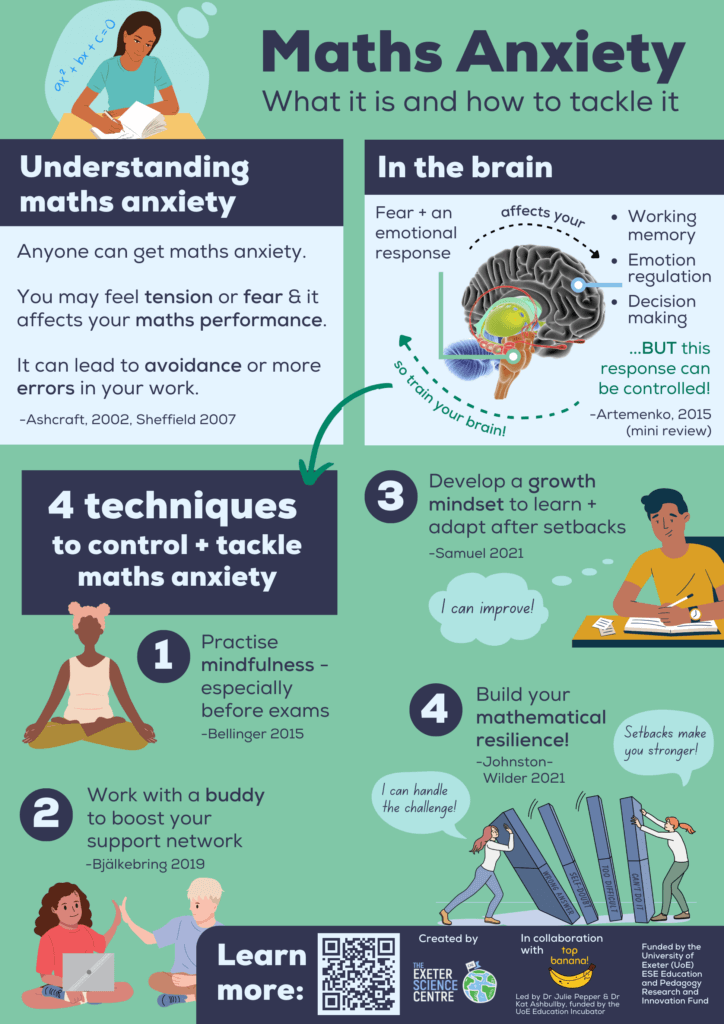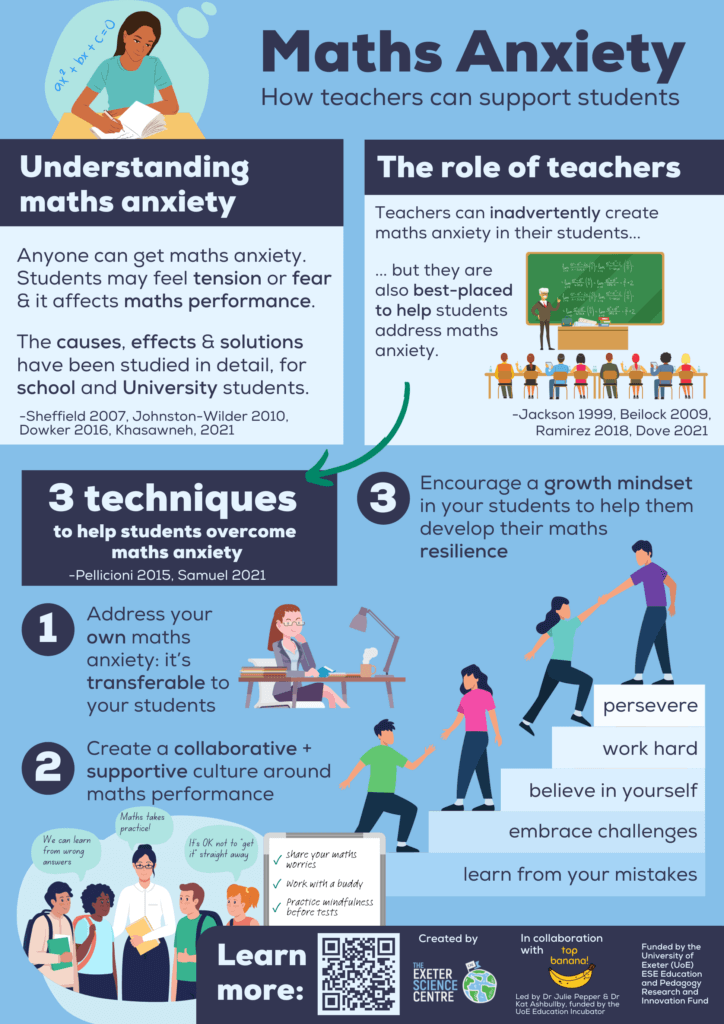Tackling Maths Anxiety

We’re working with psychologists at the University of Exeter on a project to help highlight the causes, effects and solutions of maths anxiety in students, and to understand how teachers can help.
Check out the resources for students and teachers below, and get a quick overview in our short videos:
For Students
Many people are affected by maths anxiety; it can range from feelings of worry about your mathematics performance, to feeling pain or fear at the prospect of doing mathematics.
So if you experience this – don’t feel bad about it! There’s loads of research about why people experience maths anxiety, and there are many different techniques that can help:

Download a high-resolution copy of this infographic in png and pdf.
More Detail
Maths anxiety really does lead to a physical response, activating regions in the brain associated with pain and fear. In the mini-review article by Artemenko et al (2015) – which highlights the many studies in this area – the authors explain how the mental effort involved in processing the negative emotions can lead to worse performance in mathematics. If students instead made an effort to control and reduce these emotions, their performance improved.
There are a number of techniques for controlling a negative emotional response. Mindfulness seems especially useful for maths anxiety as it disrupts rumination; dwelling on negative emotions and the prospect of failure. Instead, using mindfulness can help you focus on the task more clearly. Bellinger et al (2015) found that students that self-reported as having more mindful tendencies had lower anxiety and made fewer mistakes in high-pressure maths situations. The research by Samuel and Warner (2021) explored the benefits of combining mindfulness with adopting a growth mindset at the start of a maths class (carried out across a whole semester). A growth mindset is opposite to a fixed mindset; realising you can improve, and that setbacks help you do so. By using deep breathing exercises followed by positive affirmation, growth-mindset statements (e.g. “I am capable of understanding math,” and “I expect to make mistakes today, and then learn from those mistakes”) students felt less anxious, and more confident in their maths abilities.
It might also be helpful to work with a friend to solve problems if you suffer from maths anxiety. The study by Bjälkebring (2019) suggested that maths-anxious individuals feel that working with a friend is helpful, and perhaps study groups or a ‘buddy’ system could provide a useful support network.
The final technique we highlight is building mathematical resilience – a concept coined by Sue Johnston-Wilder and Clare Lee (find out more at the mathematical resilience website). It involves appreciating the need to struggle through problems, adopting a growth mindset and having the resources available to learn most effectively; overall, this leads to a learner that’s more prepared and resilient to setbacks.
For Teachers
There’s lots of research on maths anxiety – here, we pick out some useful resources to help you understand more about it, and list out the papers referenced in the infographics above.
Further Reading / Watching
PISA 2012 Results: Ready to Learn (Volume III) Students’ Engagement, Drive and Self-Beliefs – a thorough analysis of research and data concerning student performance and perceptions of education, and particularly mathematics, across many different countries. See page 98 for a discussion of maths anxiety.
Maths anxiety crash course: The Maths Anxiety Research Group at the University of Derby have produced a crash course about maths anxiety here: https://marg.wp.derby.ac.uk/
Growth mindset: We love this Khan Academy video about how your brain can change by adopting a growth mindset:
Infographic references
- Ashcraft, M. H. (2002). Math Anxiety: Personal, Educational, and Cognitive Consequences. Current Directions in Psychological Science, 11(5), 181-185.
- Sheffield, D. & Hunt, T. (2007). How Does Anxiety Influence Maths Performance and What Can We do About It? MSOR Connections, 6.
- Artemenko, C., Daroczy, G. and Nuerk, H.-C. (2015) Neural correlates of math anxiety – an overview and implications. Frontiers in Psychology, 6(1333).
- Bellinger, D.B., DeCaro, M.S., Ralston, P.A.S. (2015) Mindfulness, anxiety, and high-stakes mathematics performance in the laboratory and classroom. Consciousness and Cognition, 37(123).
- Bjälkebring, P. (2019) Math Anxiety at the University: What Forms of Teaching and Learning Statistics in Higher Education Can Help Students With Math Anxiety? Frontiers in Education, 4(30).
- Samuel, T. S. & Warner, J. (2021) “I Can Math!”: Reducing Math Anxiety and Increasing Math Self-Efficacy Using a Mindfulness and Growth Mindset-Based Intervention in First-Year Students, Community College Journal of Research and Practice, 45(3), 205-222.
- Johnston-Wilder, S., Lee, C. & Mackrell, K. (2021). Addressing Mathematics Anxiety through Developing Resilience: Building on Self-Determination Theory. Creative Education, 12, 2098-2115.
- Johnston-Wilder, S. & Lee, C. (2010). Developing mathematical resilience. In: BERA Annual Conference 2010, 1-4 Sep 2010, University of Warwick.
- Khasawneh, E., Gosling, C. & Williams, B. (2021). What impact does maths anxiety have on university students? BMC Psychology 9(37).
- Jackson, C. D., & Leffingwell, R. J. (1999). The Role of Instructors in Creating Math Anxiety in Students from Kindergarten through College. The Mathematics Teacher, 92(7), 583–586.
- Ramirez, G., Hooper, S. Y., Kersting, N. B., Ferguson, R., & Yeager, D. (2018). Teacher Math Anxiety Relates to Adolescent Students’ Math Achievement. AERA Open, 4(1).
- Dove, J., Montague, J., & Hunt, T. E. (2021). An exploration of primary school teachers’ maths anxiety using interpretative phenomenological analysis. International Online Journal of Primary Education (IOJPE), 10(1), 32-49.
- Suárez-Pellicioni, M., Núñez-Peña, M.I. & Colomé, À. (2016). Math anxiety: A review of its cognitive consequences, psychophysiological correlates, and brain bases. Cognitive, Affective, & Behavioral Neuroscience, 16, 3–22.
Meet the Academics

Dr Julie Pepper
University of Exeter
Julie’s background is in mathematics and psychology, and she has a keen interest in maths anxiety and education, as well as workplace psychology and health & wellbeing. Find out more about Julie here.

Dr Katherine Ashbullby
University of Exeter
Katherine’s research has spanned across different areas of psychology, including economic, organisational, health and environmental psychology. She is also passionate about student health and wellbeing. Find out more about Katherine here.
